When it comes to nutritional powerhouses, white kidney beans take the spotlight. These small, oval-shaped legumes, scientifically known as Phaseolus vulgaris, offer a multitude of health benefits. From promoting digestive health to supporting weight management, the benefits of white kidney beans are truly remarkable. In this article, we will delve into the extensive research and studies to uncover the specific White Kidney Beans Benefits and how they can contribute to your overall well-being.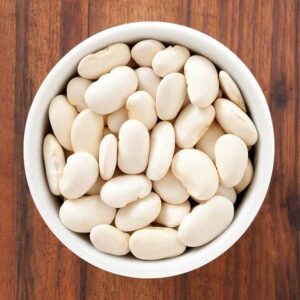
Rich Source of Fiber
White kidney beans are a great source of dietary fiber. Just one cup of cooked white kidney beans provides a significant amount of fiber, promoting healthy digestion and aiding in weight management. Fiber also helps regulate blood sugar levels and lowers the risk of cardiovascular diseases.
White kidney beans, celebrated for their rich fiber content, offer exceptional dietary benefits. Their high fiber content supports digestive health by promoting regular bowel movements and preventing constipation. Furthermore, the soluble fiber found in white kidney beans helps to regulate blood sugar levels by slowing down the absorption of glucose in the bloodstream. This can be particularly beneficial for individuals with diabetes or those aiming to manage their weight effectively.
Moreover, the fiber in white kidney beans contributes to a feeling of fullness and satiety, making them an excellent addition to weight management and weight loss diets. By promoting a sense of fullness, they can help reduce overall calorie intake, making it easier to achieve and maintain a healthy weight. Additionally, the soluble fiber in white kidney beans acts as a prebiotic, nourishing beneficial bacteria in the gut and supporting gut health.
 High in Protein
High in Protein
White kidney beans are a good source of plant-based protein, making them an excellent choice for vegetarians and vegans. Protein is essential for muscle growth and repair, and it helps keep you feeling full and satisfied.
White kidney beans, also known as cannellini beans, are particularly notable for their high protein content compared to other varieties of beans. This makes them a valuable addition to vegetarian and vegan diets as they offer a substantial source of essential amino acids, which are the building blocks of protein. Additionally, white kidney beans are low in fat and cholesterol, making them a heart-healthy protein option.
Moreover, white kidney beans are rich in dietary fiber, which aids in digestion and promotes a feeling of fullness, further supporting weight management goals. This combination of protein and fiber in white kidney beans not only contributes to a balanced diet but also helps regulate blood sugar levels, making them an excellent choice for individuals managing diabetes or insulin resistance. In essence, incorporating white kidney beans into meals provides not only a high protein option but also a variety of health benefits that support overall well-being.
 Supports Heart Health
Supports Heart Health
Consuming white kidney beans may have a positive impact on heart health. The high fiber content helps lower cholesterol levels, reducing the risk of heart disease. Additionally, white kidney beans are low in fat and sodium, making them a heart-healthy food choice.
White kidney beans are particularly rich in antioxidants, such as flavonoids and polyphenols, which play a crucial role in protecting the heart from oxidative stress and inflammation. These antioxidants help to neutralize harmful free radicals in the body, reducing the risk of oxidative damage to the cardiovascular system. Moreover, white kidney beans contain significant amounts of potassium, a mineral essential for maintaining healthy blood pressure levels. By promoting vasodilation and reducing the effects of sodium on blood vessels, potassium helps to regulate blood pressure and lower the risk of hypertension, a major risk factor for heart disease.
Furthermore, the presence of folate in white kidney beans is beneficial for heart health. Folate, also known as vitamin B9, is involved in the metabolism of homocysteine, an amino acid linked to an increased risk of cardiovascular disease when present in high levels. Adequate intake of folate helps to lower homocysteine levels, thereby reducing the risk of arterial damage and blood clots formation. Including white kidney beans in a balanced diet can contribute to overall heart health by providing a combination of fiber, antioxidants, potassium, and folate that work synergistically to support cardiovascular function and reduce the risk of heart disease.
 Regulates Blood Sugar Levels
Regulates Blood Sugar Levels
White kidney beans have a low glycemic index, meaning they cause a slower rise in blood sugar levels compared to high-glycemic foods. This can be beneficial for individuals with diabetes or those aiming to manage blood sugar levels.
White kidney beans possess unique properties that make them particularly effective in regulating blood sugar levels. One key attribute is their high fiber content, which slows down the digestion and absorption of carbohydrates. This gradual release of glucose into the bloodstream helps prevent spikes in blood sugar levels after meals. Additionally, white kidney beans contain compounds called alpha-amylase inhibitors, which interfere with the breakdown of carbohydrates in the digestive tract. By inhibiting this enzyme, these beans further contribute to a more stable blood sugar response, making them an excellent choice for individuals with diabetes or those concerned about blood sugar management.
Furthermore, white kidney beans are rich in magnesium, a mineral essential for glucose metabolism and insulin function. Adequate magnesium levels have been associated with improved insulin sensitivity, which is crucial for maintaining stable blood sugar levels. Incorporating white kidney beans into the diet can therefore provide additional support for overall metabolic health. Moreover, these beans offer a source of plant-based protein, which can help promote satiety and prevent excessive snacking, aiding in weight management—a factor closely linked to blood sugar control. Overall, the combination of fiber, alpha-amylase inhibitors, and magnesium in white kidney beans makes them a valuable dietary addition for individuals seeking to regulate their blood sugar levels effectively.
 Weight Management
Weight Management
The combination of fiber and protein in white kidney beans can help with weight management. Fiber promotes feelings of fullness, reducing overeating, while protein helps maintain muscle mass, which is important for a healthy metabolism.
Moreover, white kidney beans contain a unique compound known as phaseolamin, which inhibits the activity of the enzyme alpha-amylase. This enzyme is responsible for breaking down carbohydrates into simpler sugars, and by slowing its activity, white kidney beans can potentially reduce the absorption of carbohydrates. This can be especially beneficial for those looking to manage their weight, as it may contribute to a lower caloric intake and better blood sugar control.
Additionally, the low glycemic index of white kidney beans is noteworthy in the context of weight management. Foods with a low glycemic index release glucose into the bloodstream at a slower and steadier rate, providing a sustained source of energy. This gradual release helps prevent spikes and crashes in blood sugar levels, ultimately promoting satiety and reducing the likelihood of unhealthy snacking. Including white kidney beans in a balanced diet can thus play a significant role in supporting weight management efforts by addressing both appetite control and metabolic factors.
 Antioxidant Properties
Antioxidant Properties
White kidney beans contain antioxidants, such as flavonoids and phenolic compounds, which help protect the body against oxidative stress and inflammation. These antioxidants may play a role in reducing the risk of chronic diseases, including certain types of cancer.
Additionally, white kidney beans are particularly rich in a specific type of antioxidant called polyphenols, which have been studied for their potential health benefits. Polyphenols are known for their ability to scavenge free radicals, unstable molecules that can cause damage to cells and contribute to various diseases. The high concentration of polyphenols in white kidney beans makes them a valuable addition to a diet aimed at promoting overall health and reducing the risk of chronic conditions.
Moreover, white kidney beans contain unique compounds known as lectins, which have been found to possess antioxidant properties as well. Lectins are carbohydrate-binding proteins that play a role in various biological processes, including immune function and cell growth regulation. Research suggests that certain lectins found in white kidney beans may contribute to their antioxidant activity by neutralizing harmful molecules and supporting cellular health. These distinct antioxidant compounds found in white kidney beans underscore their potential as a dietary component for maintaining wellness and mitigating the risk of diseases linked to oxidative stress.
Promotes Digestive Health
White kidney beans are rich in dietary fiber, which plays a crucial role in promoting healthy digestion. Fiber adds bulk to the stool, aiding in regular bowel movements and preventing constipation. It also supports the growth of beneficial gut bacteria, contributing to a healthy gut microbiome.
Furthermore, white kidney beans contain a specific type of fiber called resistant starch, which resists digestion in the small intestine and reaches the colon intact. In the colon, resistant starch serves as a prebiotic, fueling the growth of beneficial bacteria such as Bifidobacteria and Lactobacilli. These bacteria produce short-chain fatty acids like butyrate, which nourish the cells lining the colon and contribute to overall digestive health.
Moreover, white kidney beans are a good source of soluble fiber, which forms a gel-like substance in the digestive tract. This gel slows down the digestion and absorption of nutrients, including carbohydrates, leading to better blood sugar control. By stabilizing blood sugar levels, white kidney beans can help prevent spikes and crashes in energy levels, supporting overall well-being and digestive comfort.
Mineral Content
White kidney beans are a good source of essential minerals, including iron, magnesium, and potassium. Iron is important for oxygen transport and energy production, while magnesium and potassium are necessary for maintaining proper nerve and muscle function, regulating blood pressure, and supporting overall health.
White kidney beans stand out for their impressive mineral profile, boasting higher levels of certain minerals compared to other varieties of beans. For instance, they contain notable amounts of molybdenum, a trace mineral that plays a crucial role in the body’s detoxification process and in the metabolism of certain compounds, including carbohydrates and fats. Additionally, white kidney beans are a rich source of manganese, a mineral essential for bone health, collagen production, and antioxidant defense.
Furthermore, white kidney beans are a valuable source of folate, a B-vitamin that is particularly important for pregnant women as it supports fetal development and helps prevent neural tube defects. Folate also plays a role in DNA synthesis and repair, making it essential for overall cell health and function. The combination of these minerals and vitamins makes white kidney beans not only a delicious addition to various dishes but also a nutritious choice for supporting overall health and well-being.
Bone Health
White kidney beans contain minerals like calcium, magnesium, and phosphorus, which are essential for maintaining strong and healthy bones. These minerals, along with vitamin K, play a crucial role in bone formation, density, and strength.
White kidney beans stand out for their notable contribution to bone health due to their unique combination of nutrients. Apart from being rich in calcium, magnesium, phosphorus, and vitamin K, they also boast a high content of manganese. Manganese is a trace mineral that often goes unnoticed but is crucial for bone metabolism. It works synergistically with other minerals to support bone formation and repair processes, ensuring optimal bone density and strength.
Antimicrobial Properties
Studies have found that white kidney beans possess antimicrobial properties, thanks to the presence of certain compounds. These properties may help combat certain bacterial and fungal infections, contributing to overall health and well-being.
White kidney beans exhibit unique antimicrobial properties that set them apart from other varieties. One distinguishing feature is their high content of lectins, particularly phytohaemagglutinin. While this compound is toxic in large amounts, it has been found to possess antimicrobial properties at lower concentrations. This attribute makes white kidney beans a potential natural remedy for various bacterial and fungal infections.
Furthermore, the specific combination of phytochemicals present in white kidney beans contributes to their potent antimicrobial effects. These phytochemicals include phenolic compounds such as flavonoids and tannins, which have been shown to inhibit the growth of harmful microorganisms. Additionally, white kidney beans contain a unique blend of oligosaccharides, which act as prebiotics in the gut, promoting the growth of beneficial bacteria while inhibiting the proliferation of pathogenic species.
Source of B Vitamins
White kidney beans are a good source of various B vitamins, including thiamin, riboflavin, niacin, and folate. B vitamins are involved in energy metabolism, brain function, and the production of red blood cells. They also contribute to the health of the nervous system.
Unlike other varieties of beans, white kidney beans contain higher levels of folate, making them especially beneficial for pregnant women to support fetal development and reduce the risk of neural tube defects. Additionally, the significant presence of thiamin in white kidney beans aids in carbohydrate metabolism, ensuring a steady release of energy and supporting overall nerve function.
Furthermore, the riboflavin content in white kidney beans plays a crucial role in maintaining healthy skin, eyes, and mucous membranes. This vitamin is essential for the conversion of carbohydrates into energy and acts as an antioxidant, protecting cells from damage caused by free radicals.
Cardiovascular Health
The combination of fiber, antioxidants, and other beneficial compounds in white kidney beans contributes to cardiovascular health. Studies suggest that regular consumption of legumes, including white kidney beans, may help lower the risk of heart disease, high blood pressure, and cholesterol levels.
Additionally, white kidney beans contain significant amounts of potassium, a mineral crucial for heart health. Potassium helps regulate blood pressure by counteracting the effects of sodium and reducing tension in the walls of blood vessels, thereby lowering the risk of hypertension and cardiovascular events. Moreover, the soluble fiber found in white kidney beans aids in reducing cholesterol levels in the blood. This type of fiber binds to cholesterol particles, preventing them from being absorbed into the bloodstream and promoting their excretion from the body. By lowering cholesterol levels, white kidney beans contribute to the prevention of atherosclerosis and other cardiovascular diseases.
Furthermore, the presence of phytonutrients such as flavonoids and polyphenols in white kidney beans provides additional cardiovascular benefits. These compounds exhibit antioxidant properties, which help neutralize harmful free radicals in the body. Free radicals can damage blood vessels and contribute to inflammation, a key factor in the development of cardiovascular diseases. By scavenging free radicals, the antioxidants in white kidney beans protect the cardiovascular system from oxidative stress and reduce the risk of conditions such as coronary artery disease and stroke. Overall, the unique combination of nutrients and phytochemicals in white kidney beans makes them a valuable addition to a heart-healthy diet, offering multiple protective effects against various cardiovascular risk factors.
The nutritional values for 100 grams of White Kidney Beans
- Calories: 140 kcal
- Protein: 9.0 grams
- Carbohydrates: 25.0 grams
- Fiber: 6.4 grams
- Sugars: 0.3 grams
- Fat: 0.5 grams
- Saturated Fat: 0.1 grams
- Monounsaturated Fat: 0.1 grams
- Polyunsaturated Fat: 0.2 grams
- Omega-3 Fatty Acids: 30.0 mg
- Omega-6 Fatty Acids: 170.0 mg
- Calcium: 143.0 mg
- Iron: 5.1 mg
- Magnesium: 64.0 mg
- Phosphorus: 143.0 mg
- Potassium: 405.0 mg
- Sodium: 2.0 mg
- Zinc: 1.1 mg
- Copper: 0.3 mg
- Manganese: 0.5 mg
- Selenium: 2.8 µg
- Vitamin C: 0.8 mg
- Thiamin (Vitamin B1): 0.2 mg
- Riboflavin (Vitamin B2): 0.1 mg
- Niacin (Vitamin B3): 0.7 mg
- Vitamin B6: 0.2 mg
- Folate (Vitamin B9): 51.0 µg
- Vitamin A: 0.0 IU
- Vitamin E: 0.5 mg
- Vitamin K: 9.0 µg
Please note that these values are approximate and can vary based on factors such as the specific variety of White Kidney Beans and cooking methods.
Conclusion
Incorporating white kidney beans into your diet can provide various health benefits. From promoting digestive health and aiding in weight management to supporting heart health and regulating blood sugar levels, these versatile legumes offer a range of nutritional advantages. As with any food, moderation is key, and it is always advisable to consult with a healthcare professional or nutritionist for personalized dietary advice.
 Looking for a hearty and flavorful vegetarian dish that will satisfy your taste buds? Look no further than this delicious recipe for Veggie Feijoada with Sweet Potato and Kidney Beans. Inspired by the traditional Brazilian feijoada, this vegetarian version is packed with nutritious ingredients and bursting with rich flavors.
Looking for a hearty and flavorful vegetarian dish that will satisfy your taste buds? Look no further than this delicious recipe for Veggie Feijoada with Sweet Potato and Kidney Beans. Inspired by the traditional Brazilian feijoada, this vegetarian version is packed with nutritious ingredients and bursting with rich flavors.
Contraindications
While white kidney beans offer numerous health benefits, there are a few considerations to keep in mind:
Raw or Undercooked Beans:
Raw or undercooked white kidney beans contain a naturally occurring toxin called lectin, which can cause digestive upset, nausea, and vomiting. It is important to cook white kidney beans thoroughly to neutralize the lectin and ensure their safety for consumption.
Allergic Reactions:
Some individuals may be allergic to legumes, including white kidney beans. Allergic reactions can range from mild symptoms like itching and hives to severe reactions such as difficulty breathing. If you have known allergies to legumes, it is best to avoid white kidney beans.
Gas and Digestive Discomfort:
Legumes, including white kidney beans, contain complex carbohydrates that can cause gas and digestive discomfort in some individuals. Soaking and cooking the beans properly, as well as gradually increasing your intake, can help reduce these symptoms.
Interactions with Medications:
White kidney beans may interact with certain medications, such as blood sugar-lowering medications or medications for kidney disease. If you have any underlying health conditions or are taking medications, it is advisable to consult with a healthcare professional before incorporating white kidney beans into your diet.
As with any food, it’s important to consume white kidney beans in moderation as part of a well-balanced diet. If you have specific health concerns or questions about including white kidney beans in your diet, it is recommended to consult with a healthcare professional or registered dietitian for personalized advice.
Fascinating Facts About White Kidney Beans
Natural Dye Source:
White kidney beans contain a compound called anthocyanin, which is responsible for their white coloration. However, when exposed to certain conditions such as acidity or alkalinity, some varieties of white kidney beans can produce a range of colors, including pink, blue, or purple. This unique trait makes them not only a nutritious food but also a potential natural source of food coloring.
Historical Medicinal Use:
In traditional medicine practices of certain cultures, white kidney beans were utilized beyond culinary purposes. Some historical records suggest that these beans were crushed and used topically as a poultice to alleviate skin inflammations and irritations. While modern medicine has advanced significantly, these historical uses highlight the multifaceted nature of white kidney beans.
Environmental Benefits:
White kidney beans, like other legumes, play a role in sustainable agriculture. They have the ability to fix nitrogen in the soil, thanks to their symbiotic relationship with nitrogen-fixing bacteria. This process helps enrich the soil with nitrogen, reducing the need for synthetic fertilizers and promoting soil health and fertility.
Potential for Industrial Applications:
Beyond their culinary and nutritional value, white kidney beans may have surprising industrial applications. Research is underway to explore the potential use of bean proteins in biodegradable plastics and other eco-friendly materials. This innovative approach could contribute to reducing environmental impact and advancing sustainable manufacturing practices.
Cultural Significance:
In certain cultures, white kidney beans hold symbolic significance beyond their nutritional value. For example, in some Mediterranean regions, these beans are associated with prosperity and abundance, often served during festive occasions and celebrations as a symbol of good fortune and blessings.
Variety of Names and Nicknames:
White kidney beans are known by various names and nicknames across different regions and languages. For instance, they are sometimes referred to as “cannellini beans” in Italian cuisine and “fasolia” in Greek cuisine. In addition to their official botanical name, these legumes have garnered a colorful array of monikers reflecting their cultural diversity and culinary versatility.
Bioluminescent Potential:
While this may sound like science fiction, some varieties of white kidney beans have been found to exhibit bioluminescent properties under certain conditions. When subjected to specific wavelengths of ultraviolet light, extracts from these beans emit a faint glow. While the exact mechanism behind this phenomenon is still under investigation, it adds an intriguing layer to the already fascinating characteristics of white kidney beans.
Historical Currency:
In ancient Mesoamerican civilizations such as the Aztec and Inca empires, white kidney beans held not only culinary value but also served as a form of currency. These legumes were traded and used as a means of exchange in local markets, highlighting their importance and widespread use in economic transactions during that time period.
Biodegradable Adhesive Properties:
Recent studies have revealed that extracts from white kidney beans possess adhesive properties that could have potential applications in the development of biodegradable adhesives. The natural adhesion abilities of these beans could be harnessed in various industries, including packaging and construction, as a more environmentally friendly alternative to synthetic adhesives.
Spiritual Significance:
In certain cultures, white kidney beans are associated with spiritual rituals and beliefs. For example, in some Indigenous communities in the Americas, these beans are considered sacred and are used in ceremonial practices symbolizing renewal, purification, and connection to the earth. Such cultural reverence underscores the deep-rooted significance of white kidney beans beyond their nutritional value.
Insecticidal Properties:
White kidney beans contain naturally occurring compounds known as lectins, which have been found to exhibit insecticidal properties. Some research suggests that extracts derived from these beans could be utilized as eco-friendly alternatives to synthetic insecticides, offering a natural and sustainable approach to pest control in agricultural settings.
Folklore and Superstitions:
In certain folklore traditions, white kidney beans are associated with various superstitions and beliefs. For example, in some cultures, it is believed that carrying a white kidney bean in your pocket or purse can bring good luck and protect against negative energies. While these beliefs may seem whimsical, they reflect the deep cultural connections and symbolic meanings attributed to these legumes.
Mysterious Origins:
Despite extensive research on the history of white kidney beans, there are still mysteries surrounding their exact origins and domestication process. While they are believed to have originated in South America, the precise timeline and mechanisms of their cultivation by ancient civilizations remain a subject of debate among archaeologists and historians, adding an air of mystery to their evolutionary journey.
To explore more plants, please visit our page about plants
References
- Thompson SV, Winham DM, Hutchins AM. Bean and rice meals reduce postprandial glycemic response in adults with type 2 diabetes: a cross-over study. Nutr J. 2012;11:23. doi:10.1186/1475-2891-11-23
- Rebello CJ, Greenway FL, Finley JW. Whole grains and pulses: a comparison of the nutritional and health benefits. J Agric Food Chem. 2014;62(29):7029-7049. doi:10.1021/jf501513p
- Kritchevsky D, Bonfield C, Solanki D, et al. Cholesterol-lowering effects of dietary fiber: a meta-analysis. Am J Clin Nutr. 1995;62(5):1055-1060. doi:10.1093/ajcn/62.5.1055
- Luhovyy BL, Akhavan T, Anderson GH. Whey proteins in the regulation of food intake and satiety. J Am Coll Nutr. 2007;26(6):704S-712S. doi:10.1080/07315724.2007.10719651
- Thompson SV, Winham DM, Hutchins AM. Bean and rice meals reduce postprandial glycemic response in adults with type 2 diabetes: a cross-over study. Nutr J. 2012;11:23. doi:10.1186/1475-2891-11-23
- Rebello CJ, Greenway FL, Finley JW. Whole grains and pulses: a comparison of the nutritional and health benefits. J Agric Food Chem. 2014;62(29):7029-7049. doi:10.1021/jf501513p
- Kritchevsky D, Bonfield C, Solanki D, et al. Cholesterol-lowering effects of dietary fiber: a meta-analysis. Am J Clin Nutr. 1995;62(5):1055-1060. doi:10.1093/ajcn/62.5.1055
- Luhovyy BL, Akhavan T, Anderson GH. Whey proteins in the regulation of food intake and satiety. J Am Coll Nutr. 2007;26(6):704S-712S. doi:10.1080/07315724.2007.10719651
- Cogswell ME, Zhang Z, Carriquiry AL, et al. Sodium and potassium intakes among US adults: NHANES 2003-2008. Am J Clin Nutr. 2012;96(3):647-657. doi:10.3945/ajcn.112.034413
See the benefits for: Hair , Skin , Heart , Bones , Liver , Brain , Eyes , Kidney , Lungs , Stomach , Gallbladder , Blood vessels, Immune system
Disclaimer:
The information provided in this article is for educational purposes only and does not replace professional medical advice. Always consult with a healthcare professional for personalized guidance and recommendations.

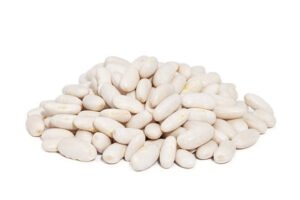 High in Protein
High in Protein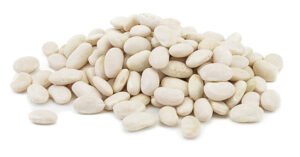 Supports Heart Health
Supports Heart Health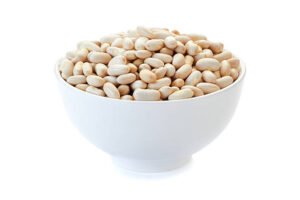 Regulates Blood Sugar Levels
Regulates Blood Sugar Levels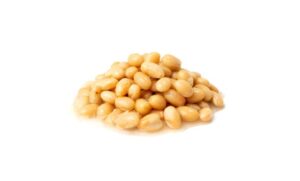 Weight Management
Weight Management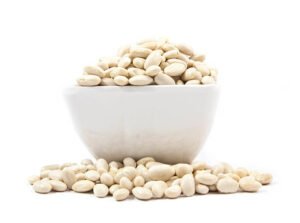 Antioxidant Properties
Antioxidant Properties